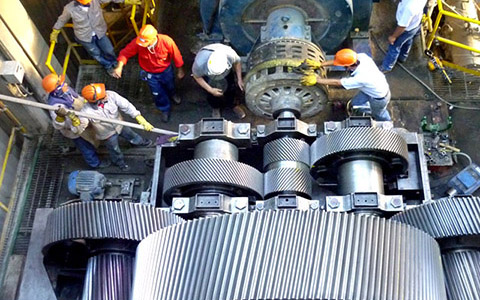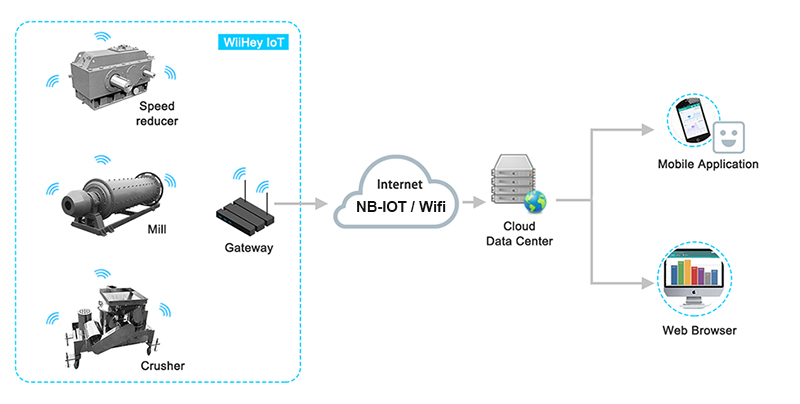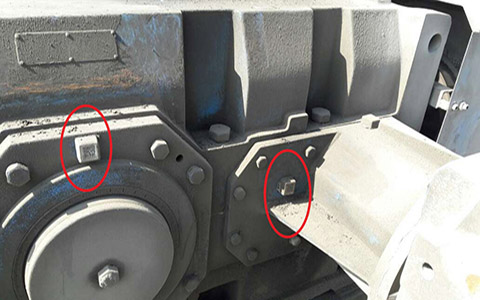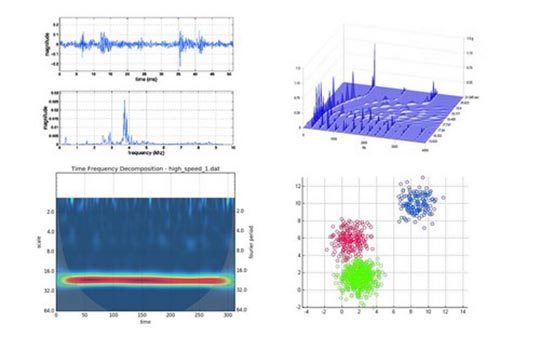Vibration condition monitoring
Unattended triaxial vibration/condition monitoring by Bluetooth wireless acceleration sensor for speed reducer, gearbox, air compressor, or other rotary device
Introduction
In the cement process industry, speed reducers / gearboxes are present as core parts in most equipment, such as, ball grinder, roll squeezers, crushers, conveyor, and so on. These equipment are mostly expensive, large scale, heavy duty, and overtime working in severe environment; therefore, regular inspection is very important to examine the predictive malfunction and the normal abrasion to make the further decision, such as, maintenance, repair, or continue working.
There are regulation and standards for the regular inspection in most equipment, but real operation is often not effective, because the inspection frequency is mostly low, also there is no specific visual data recording saved for comparison and analyzation.

Maintenance of gearboxs
Vibration monitoring system
Vibrations are the basis for assessing machine conditions. Condition monitoring essentially comprises the measurement and recording of overall vibration values and operating parameters. It provides information and allows the diagnosis of the general machine condition or very specific ‘disorders’ of the machine.
WiiHey has brought up a new smart vibration monitoring system with MEMS and IoT technologies. Breakthroughs in MEMS technology make sensors much smaller and affordable. Nowadays, with same budget, more sensors could be placed on machine components to precisely localize the vibrating source. While the IoT technology provides wireless connectivity so that experts could gain nearly-real-time visibility into machine conditions without traveling to locations.
Technical specification
- 3-axis MEMS accelerometer;
- ±2g/4g/8g/16g selectable scales, 8 to 12 bit resolution;
- 10 Hz to 1.6 kHz output rate, 0~800 Hz bandwidth;
- BLE 2.4G Bluetooth wireless low power sensor node;
- NB-IOT / Wifi Version Date Collector/ Transmitter/ Gateway;
- Range: 20 meters line of light;
- Max. Linking to one gateway: 20 sensor nodes;
- 1 year battery life @ date upload each 5 minutes;
- Magnet surface mounted installation;
- PC browser and Mobile APP monitoring;
- Rich cloud services like data fusion, display and analysis, etc;
- Quickly assess machine conditions, recognize warning signs.
Benefits
- Continuous and cyclic acquisition of overall vibration values;
- 24/7 remote monitoring, skip the costly old-fashioned manual inspections;
- Enables the identification of machine faults and give early warnings;
- Localizes the affected components to provide information on root causes;
- Prevent equipment failures and avoid unscheduled downtime.
Architecture
Integrated system includes monitoring targets, sensors, gateway, cloud services and user terminals:

System architecture
Hardware installation
Sensors are placed on the components where potential problems such as unbalance, misalignment, looseness or gear failures are easy to occur. Eg. for a three-step speed reducer, there are several key points for sensors to be mounted:

Sensor mounting points
Here is a close look of the sensors. The sensor uses MEMS accelerometer to acquire vibration data, it has battery inside and supports wireless connectivity with gateway, so that no hard wire is required. The gateway transmits data to the cloud for further process. Detailed information of sensor could be found here - WiiMine Sensor.

WiiMine sensors
Software
The cloud supports rich software services including data display, data analysis and message notification. The data analysis allow user to see trending of the overall values, perform wavelet transform, or calculate statistics of comparison for prediction and optimization of subsequent maintenance. Detailed information of cloud services could be found here - WiiMatrix.

Data display on PC browser

Data analysis by algorithm

Notification of warn message on mobile APP (Wechat)
Summary
By continuous vibration detecting and recording, the IOT vibration monitoring system analyzes the predictive malfunction of the machine and suggests the relative maintenance of repair, to avoid the final major failure.
The IoT (Internet of Things) enables condition monitoring to be performed in a remote and wireless way, plants could automate maintenance processes to increase efficiencies and decrease costs.
